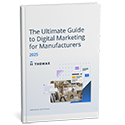Your Secret Weapon to Influencing Decision Makers throughout the Buying Process
Team Thomas November 28, 2011
The industrial buying process can be long and complex, often with numerous decision makers involved. Constraints with time and resources increase complications in the buying process. This is further aggravated by efforts to reduce risk. Two recent Industrial Purchasing Barometer (IPB) surveys, conducted by Thomas Industrial Network, dive deeper into the minds of industrial buyers and decision makers and provide insight into what suppliers can do to better understand the buying cycle and help close more sales.
Order Sizes Affect the Buying Process
An August 2011 IPB survey of industrial buyers shows that purchasing authority varies with order size. Nearly 70% of buyers who responded state that they are authorized to make purchases under $10,000, but only 38% have final say on orders of $50,000 or less. This number drops to just 23% for purchases worth more than $250,000.
This same relationship can be found between purchase cost and the length of time required to finalize the purchase. Orders of less than $10,000 typically require less than 1 month (72%), whereas purchases of more than $250,000 required at least 7 months (42%) and sometimes more than a year to approve.
The reason for these longer buying cycles, it appears, is that as the investment increases, so do the number of individuals involved in purchasing decisions. On purchases that top $250,000, 45% of respondents say 2 to 4 people must approve the order, while 27% require sign off from 5 or more persons.
The Industrial Buying Committee
The typical "committee" of purchasing decision makers will consist of individuals who can be categorized in one of four camps:
Gatekeepers, which includes executive assistants and others who have the ability to either provide or deny access to more powerful committee members.
Information gatherers, who will reach out to you about your company and its products/services, but who have limited or no purchasing authority.
Influencers, which may include consultants, middle managers, or others who do not have direct purchasing authority but do have significant input on decisions.
Champions, who have ultimate purchasing authority.
Detailed Information Affects Buying Decisions
With so many "hands in the pot," it's no wonder that the industrial buying process can be long and complex. Many of the individuals within a given buying "committee" will hold unique roles in the buying process, and as such, may be looking for different information (see sidebar).
A September 2011 IPB survey asked industrial buyers what information was most influential in making purchasing decisions. Responses, which include all members of the buying "committee," show that the most critical information a product manufacturer can provide is detailed product information and specifications (82%), as well as full product catalogs and brochures (54%). For custom manufacturers, the most influential information is details on specializations and expertise (74%), followed by applications and capabilities (69%).
These weren't the only pieces of information that drew mention. Brands carried, part numbers, equipment lists, ISO and other certifications all proved valuable in purchasing decision making. Even customer lists, company history and case studies made the list.
What Does This Mean to You?
Using the information mentioned above, industrial suppliers can influence the buying process and build confidence in their brand and company in the mind of buyers. The most effective way to leverage this information is through a pervasive online marketing strategy, at the center of which is robust and content-rich website that speaks to all roles of a buyer's organization—from engineers to CEOs—the possible members of the buying "committee."
Why a website? Because multiple IPB surveys have shown that 97% of industrial buyers use the Internet to research potential new suppliers, and the most likely place they will go to find information about your company is your website. A robust website, when included as part of a complete online marketing strategy, is your secret weapon for influencing buyers in all stages of the buying cycle—before the buyer is aware of their need, during the research and decision making stage, and after the purchase to reinforce brand messaging and ensure repeat purchases.
Industrial suppliers that do not have an online marketing strategy and detailed website will struggle to influence all members of the buying "committee," particularly throughout long buying cycles, and ultimately risk losing business.
Did you find this useful?









